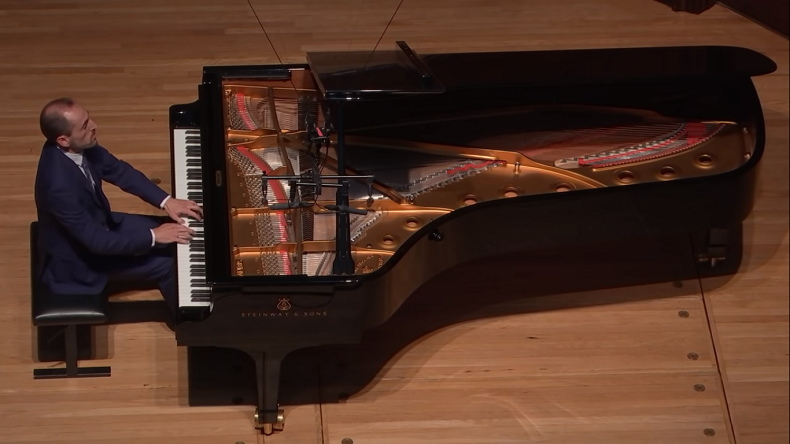 United Kingdom C. P. E. Bach, Ligeti, Schumann, Danny Driver (piano): Wigmore Hall, London, 1.10.2020. (CC)
United Kingdom C. P. E. Bach, Ligeti, Schumann, Danny Driver (piano): Wigmore Hall, London, 1.10.2020. (CC)

C. P. E. Bach – Sonata in F sharp minor, Wq.52 No.4
Ligeti – Etudes Book II: Etude No.12 Entrelacs; Etudes Book I: Etude No.4 Fanfares
Robert Schumann – Études symphoniques, Op.13
ENCORE: Ligeti – Etudes Book II: Etude No.8 Fém
What splendidly adventurous programming! Danny Driver has never once disappointed in my experience, and this being my first concert at the Wigmore Hall since before March, it was a delight to hear performances as radiant as these.
Johann Sebastian Bach’s fifth son, Carl Philipp Emanuel has a justified reputation for the unexpected; and the F sharp minor Sonata certainly backed that up, with stark contrasts between, in Driver’s hands, incredibly fluent runs and more reflective musings. Driver understood that it is juxtaposition that lies at the heart of this music in the first movement Allegro, while for the central Poco andante we heard a fascinating cross between early Haydn and an opera aria. The quirky leaps of the finale, and some lovely two-part counterpoint later (think the earlier Haydn keyboard sonatas again here) rounded off the performance perfectly, Driver’s cleanliness of execution allowing for maximal enjoyment.
The Wigmore Hall holds some treasured memories of Ligeti performances, not least a complete Etudes with Pierre-Laurent Aimard and Musica Ricercata with Roman Rabinovich. Both Etudes here are marked ‘Vivacissimo’. Entrelac uses criss-cross patterns in a sort of post-Impressionist haze while Fanfares finds repeated scales against fanfare-like chords continually changing places between the hands. If Driver was a little restrained in comparison to the Aimard performances I have heard, his take perhaps implied an internal stillness at the heart of all that activity. (Driver’s encore would be a further Ligeti Etude.)
C. P. E Bach, Ligeti and Schumann are all mavericks of one type or another. Schumann’s truly Romantic outlook still left room for creating a vision all of its own and including some truly remarkable writing (the late Gesänge der Frühe, Op.133, perhaps a case in point). Weighting the theme perfectly, his bass-rich but not bass-drenched sound meant the theme had just the right amount of meat on its bones. Tight bass staccato in the first variation (and the third for that matter) reflected the care with which Driver uses the sustaining pedal, his tone nevertheless rich and satisfying, as was his projection of the soprano line in the song-like second variation. Sforzati were never snatched (Variation IV). If the fifth variation was perhaps a little laboured there was no doubting the proper ‘agitato’ nature of the sixth, nor the accuracy both of notes and of realising what Schumann wrote on the page in terms of dynamics and structure. This realisation of intent was possibly most successful in the dotted, ‘French Overture’ nature of the eighth variation, where Schumann asks for ‘sempre marcatissimo’ despite pedal; the answer’s in the articulation, and how Driver knew it. He even managed a proper sustained staccato (heard from the very, very back of the hall) in the ninth. And how deliciously he laid out the counterpoint – all performed by the right hand while the left is kept busy with some nice demisemiquavers – in the eleventh. If the finale slightly sagged (treasured memories of a hyperelectrified Pogorelich performance at the Royal Festival Hall – in which the entire audience almost flew off its seats at the end – remain), Driver’s performance retained a sense of dignity, of exploration, that speaks of a musician of the finest integrity and intelligence.
So no posthumous variations here, reminding us that Op.13 stands perfectly well on its own two feet (Driver eschewed them also in his St John’s Smith Square performance in November 2016, which I reported on elsewhere but Robert Beattie took on for Seen and Heard click here). At the time of writing, this recital is available on the Wigmore Hall website click here. Driver has made successful recordings of both Schumann and C. P. E. Bach, plus contributing the 70th volume in the Romantic Piano Concerto series on Hyperion. One should not forget two corkers on Hyperion, too: a disc of Balakirev piano music and one of Benjamin Dale, whose D minor Piano Sonata I would recommend to anyone.
A fabulous lunchtime concert!
Colin Clarke
